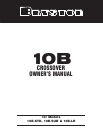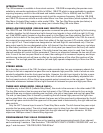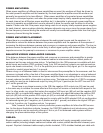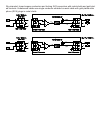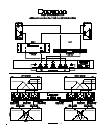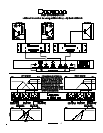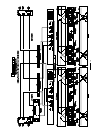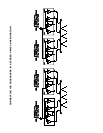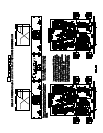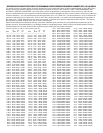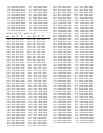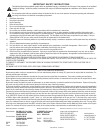INTRODUCTION:
The 10B crossover is available in three stock versions; 10B-SUB incorporating frequencies more
suitable to sub-woofer applications (40Hz to 500hz), 10B-STD which is more applicable to speakers
requiring frequency control in the mid-band and tweeter areas (70Hz to 4500Hz) and the 10B-LR,
which uses plug in resistor programming cards to set the crossover frequency. Both the 10B-SUB
and 10B-STD crossovers include a mode called Mono Low Pass (see below) which replaces the Two
Way Mono (Linkwitz-Riley) mode in older model 10B’s. The Two Way Mono mode (see below) is
retained in the 10B-LR allowing for very steep (non Linkwitz-Riley) 8th order lters.
MONO LOW PASS MODe (10B-SUB AND 10B-STD ONLy):
The 10B-STD and 10B-SUB crossovers generate a summed low pass output signal by rst summing
or adding together the left channel and right channel input signals to form a left plus right (L+R) sig-
nal. If the MODE switch (located on the rear panel) is in the Mono Low Pass position then this L+R
signal is fed into both of the low pass lter sections (Left and Right) available in the 10B. As a result,
the common low pass output can be taken from either of the two low pass (LP) outputs; either left LP
out or right LP out. These outputs are designated as Left and Right for convenience only. If the low
pass output used is the one designated as the left channel, then the crossover frequency and slope
(or lter order) switches on the left side of the unit’s front panel (as viewed from the front) will control
the low pass lter parameters. Likewise, if the right channel low pass output is used, then the right
channel switches will control its lter parameters. There is no interaction between the two sets of con-
trols. If one of the two low pass lters is not used, then settings of its crossover frequency and slope
switches are irrelevant and will have no affect on the performance of the other lter sections of the
crossover. The two high pass lter sections (left and right) operate independently in Mono low Pass
mode.
STeReO MODe:
As in the older versions of the 10B, the stereo mode provides two, two way crossovers wherein the
left input is fed into a separate low pass lter and a separate high pass lter, both of which are inde-
pendently adjustable from the front panel controls. Likewise, the right input signal is fed into a sepa-
rate low pass lter and a separate high pass lter, both of which are independently adjustable from
the front panel controls. All four lters have separate output connectors on the rear panel. There is no
interaction whatsoever between left and right channels or between low pass and high pass lters.
THRee WAy MONO MODe (10B-LR ONLy) :
Available only in the 10B-LR (Linkwitz-Riley lters), this mode is the same as in the older model 10B.
The four lter sections (two low pass and two high pass) of the 10B are combined to form a single
channel three way crossover providing one low pass, one mid or band pass and one high pass lter.
The mid (or band pass) lter is formed by combining the left channel high pass and the right chan-
nel low pass lters into a single lter wherein the lower end of the pass band is determined by the left
channel high pass controls and the upper end of the pass band is determined by the right channel low
pass controls
Only the LEFT channel input is used in Three Way Mono mode. The left channel low pass output
provides the low pass output. The mid or band pass output is taken from the right channel low pass
output connector and the high pass is taken from the right channel high pass connector. All lter
slopes are 24dB per octave, Linkwitz-Riley alignment.
PROGRAMMING THe 10B-LR CROSSOveR:
The crossover points in the 10B-LR are set by inserting small programming boards (4 per channel)
each containing 2 resistors. See illustration “10B LINKWITZ-RILEY STEREO CROSSOVER” and on
page 7 and document “10B-FREQ-RES-TABLES.doc”



